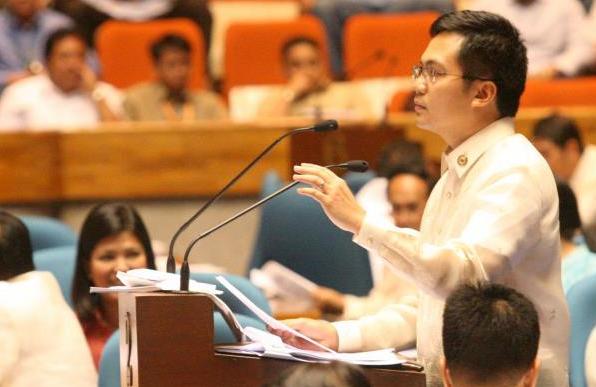
Rep. Karlo Alexei Nograles (Photo from his Facebook account)
President Rodrigo Duterte may not know how to fund the free higher education law he just signed, but the House of Representatives has pinpointed P16 billion in scholarship funds that may be realigned for that purpose.
In a statement on Wednesday, Rep. Karlo Alexei Nograles, appropriations committee chair, said he reached the breakthrough after meeting with Budget Secretary Benjamin Diokno, Commission on Higher Education Chair Patricia Licuanan, and Secretary Guiling Mamondiong, who is the director general of the Technical Education and Skills Development Authority (Tesda).
To fund the implementation of the Universal Access to Quality Tertiary Education Act (Republic Act 10931), Nograles said the House could pool together funds from various scholarships under various departments.
Such scholarship funds are currently allocated under Ched, Tesda, the Department of Health, the Department of Agriculture, the Department of Science and Technology, the Department of Environment and Natural Resources, and various state universities and colleges.
Even more funds can be raised by carving them out of the budgets of underperforming and underspending agencies if needed, Nograles said.
He noted that students from 114 SUCs, 16 local universities and colleges (LUCs) accredited by Ched and 122 technical-vocational institutions (TVIs) under Tesda would benefit from the law.
“We will be consolidating all scholarship funds and spending them according to RA 10931 since this is the latest law that supersedes all other laws, and this law takes into consideration scholarships in SUCs, LUCs, TVIs, and even private colleges and universities,” he explained.
Nograles said Ched and Tesda agreed during the meeting to come up with an accurate figure on the total number of students who would benfit from the law, to see if the P16 billion would be enough.
“What’s important right now is we know we have P16 billion and we have a source for this,” he said.
Duterte earlier admitted to reporters that he signed the law without knowing how to fund it
“That’s the problem now,” he said. “I want to ask you: Should I consult someone? I don’t know. Let’s see where,” he was reported as saying.
His economic managers tried to discourage him from ensuring that higher education would be accessible to the poor, claiming the government could not sustain it financially. Days before Duterte approved the law, Diokno claimed it would cost the government P100 billion annually.
SUCs were first allowed to forego the collection of tuition for the academic year 2017-18 under the 2017 General Appropriations Act, even before Duterte signed RA 10931.
The Duterte administration did not originally plan to make tuition free for the 2017 budget, but the Senate realigned P8.3 billion for student financial assistance, allowing SUCs to charge zero tuition.
The fund was originally supposed to be allocated to the Department of Public Works and Highways for development projects in the Autonomous Region in Muslim Mindanao. /atm